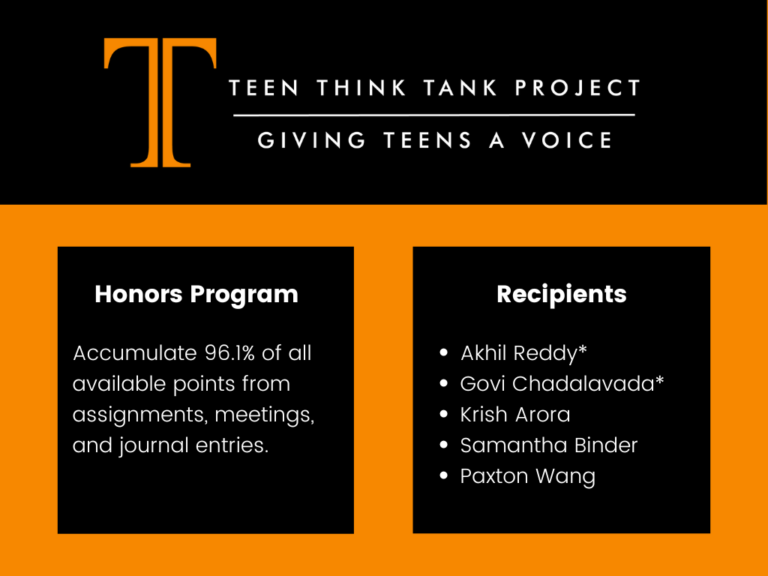Financial Security
“If poverty persists in America, it is not for lack of resources. We lack something else: the collective will to ensure everyone has a home.”
Matthew Desmond, Author
Our Mission
This research cohort of nine high-potential teens embarked on a mission to investigate and address the financial, social, and legal barriers that contribute to economic inequality in America. Through their research, they developed a profound understanding of how social stigmas, flawed policy initiatives, and inadequate healthcare systems leave millions of Americans struggling to access the mental health care they need. By empowering these young change agents with the knowledge and skills to tackle these challenges, we aim to drive meaningful solutions that can help ensure financial security for all Americans.
Our Work
On August 8, 2024, the Teen Think Tank Academy’s Financial Security Research Cohort presented its policy framework during a live webinar.
We extend our gratitude to everyone who attended the broadcast and to all who have supported our mission to achieve financial security for all Americans.
Our Framework
Barriers to Economic Equality in the United States: Analyzing Economic, Social, and Legal Impediments to Financial Security
Achieving financial equality in the United States remains a significant challenge due to a variety of interconnected barriers. Our work as a cohort combines insights from various economic, social, and legal dimensions to unravel these complex obstacles and propose actionable solutions.
Economically, the affordable housing crisis and wage disparities among large corporations create significant obstacles to financial stability. Socially, economic inequality manifests in disparate health outcomes, educational disparities, and varying cultural norms. Politically and legally, systemic issues such as an unclear definition of poverty, historical racial discrimination, and the financial repercussions faced by former inmates create entrenched disadvantages.
Addressing these multifaceted issues requires a comprehensive approach, blending educational initiatives, policy reforms, and societal shifts. Confronting historical injustices, challenging discriminatory practices, and reshaping societal norms are crucial steps toward fostering a more inclusive and equitable society. By dismantling these barriers through collaborative efforts, we can create a more financially equitable society and secure a prosperous future for all Americans.
Economic Impediments
Economically, the affordable housing crisis and wage disparities, particularly among employees of large corporations, pose substantial barriers to achieving financial stability. The scarcity of affordable housing forces many individuals and families to allocate a disproportionate share of their income to shelter, leaving little room for savings or other essential expenses. Simultaneously, wage disparities—where top executives earn exponentially more than frontline workers—exacerbate income inequality, making it increasingly difficult for lower-wage employees to attain a stable financial footing. These dual challenges create a precarious economic environment where the gap between the wealthy and those struggling to make ends meet continues to widen.
Social Impediments
Socially, financial instability reveals itself through stark differences in health outcomes, educational opportunities, and cultural experiences. Individuals in lower-income communities often face higher rates of chronic illness, limited access to quality healthcare, and shorter life expectancies compared to their wealthier counterparts. Educational disparities are equally pronounced, with underfunded schools in economically disadvantaged areas struggling to provide the same level of resources, extracurricular activities, and academic support as those in more affluent neighborhoods. This educational divide perpetuates a cycle of poverty, limiting future opportunities for upward mobility. Furthermore, economic inequality influences cultural norms, creating distinct social environments where values, behaviors, and life expectations can vary significantly based on socioeconomic status. These social disparities not only undermine the cohesion of communities but also contribute to a broader sense of division and inequity within society.
Political & Legal Impediments
Politically and legally, systemic challenges like the lack of a clear definition of poverty, the enduring impacts of historical racial discrimination, and the financial burdens imposed on former inmates contribute to deeply entrenched disadvantages. The absence of a universally accepted definition of poverty makes it difficult to implement effective policies, leaving many struggling families without the support they need. Historical racial discrimination continues to cast a long shadow, manifesting in unequal access to resources, biased law enforcement practices, and underrepresentation in political and legal systems, which perpetuates cycles of disadvantage for marginalized communities.
Additionally, former inmates face significant financial repercussions that hinder their reintegration into society. These can include difficulties finding employment due to criminal records, exorbitant legal fees, and the loss of voting rights, which further alienate them from the political process. These intertwined issues create a legal and political landscape where certain populations are systematically marginalized, making it extremely challenging for them to break free from the cycle of poverty and disenfranchisement.
Policy Recommendation
Addressing these complex and interconnected challenges demands a holistic and multifaceted strategy that integrates educational initiatives, policy reforms, and societal transformations. A comprehensive approach involves not only confronting historical injustices but also actively working to dismantle the structures that perpetuate inequality today. This means challenging discriminatory practices across all sectors—whether in education, the workplace, or the justice system—and reshaping societal norms that have long favored certain groups over others.
Educational initiatives must focus on providing equitable access to quality learning opportunities and empowering individuals with the knowledge and skills they need to succeed. Policy reforms should aim to rectify economic disparities, protect vulnerable populations, and ensure that all citizens have the tools necessary to achieve financial stability. At the same time, fostering societal shifts requires a collective commitment to inclusivity, where diversity is not just acknowledged but celebrated as a strength.
By addressing these issues through collaborative and sustained efforts, we can break down the barriers that have long hindered progress. This will pave the way for a more financially equitable society where everyone has the opportunity to thrive and ultimately secure a prosperous future for all Americans.
Read the complete policy framework on Medium.com or download it here.
Our Story
Every semester, the Teen Think Tank Project brings together high-potential teens from across America to explore, research, and develop policy frameworks addressing some of the nation’s most pressing social justice challenges. This is the story of nine teen change agents who have spent 60 hours working to transform the economic, social, and political landscape in the fight to end poverty in America!
Our Team

Connect with us on LinkedIn!
- Miah Maliha Akter Dina, IIS Via dei Papareschi, Rome, ITA
- Krish Arora, Leadership Prep School, Plano, TX
- Samantha Binder, Hillsborough High School, Tampa, FL
- Govi Chadalavada, Western Reserve Academy, Cincinnati, OH
- David Jen, The Wilberforce School, Pennington, NJ
- Nikita Kumar, Bridgewater-Raritan High School, Bridgewater, NJ
Akhil Reddy, Blue Valley High School, Overland Park, KS
Ethan Offei-Addo, Pomfret School, West Orange, NJ
Paxton Wang, St. Andrew’s School, Yorba Linda, CA









Our Motivation
Academic Honor Roll
The Teen Think Tank Project (TTTP) aims to cultivate intrinsic qualities like intellectual humility and a growth mindset among its participants, recognizing these traits as essential for both personal and social development. While we emphasize the importance of these qualities, we also value academic achievement. To honor this, we present academic awards to research associates who complete 96.1% of all assigned tasks, assignments, and meetings in each cohort. This balance between fostering intrinsic growth and acknowledging hard work underscores our dedication to nurturing well-rounded and accomplished individuals.

Congratulations to all of our research associates who excelled in our program and been given the distinction of graduation “with honors” and to Akhil and Govi for achieving “perfect” scores!
Our Scholarship
Each session, the Teen Think Tank Project awards a cash scholarship to the research associate who best embodies our community’s values. With all our talented cohort members eligible to apply, selecting the scholarship recipient is always a challenging task. This session was no different. We extend our gratitude to all who applied and commend our finalists, Ahkil Reddy and Samantha Binder, for their dedication and hard work.
Congratulations to Ahkil Reddy for being named the cohort’s Most Outstanding Research Associate and receiving a $500 scholarship!


